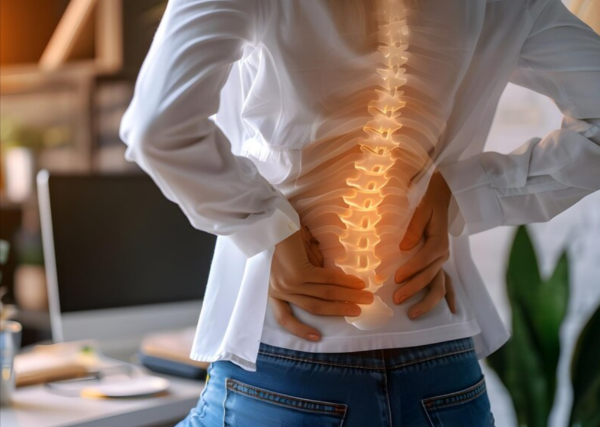Heartburn and back pain are two seemingly unrelated conditions that can significantly impact an individual’s quality of life.
While heartburn is a common digestive issue, back pain can stem from various causes, including musculoskeletal problems, injuries, or underlying health conditions.
Yes, heartburn can cause back pain. The discomfort from acid reflux may radiate to the back, especially between the shoulder blades.
However, recent research has highlighted a potential link between these two ailments, suggesting that heartburn may contribute to or exacerbate back pain in some cases.
In this comprehensive article, we will delve into the intricate relationship between heartburn and back pain, exploring the potential mechanisms that connect these two conditions.
We will also discuss the symptoms, causes, diagnosis, and treatment options for heartburn-related back pain, empowering you with the knowledge to better understand and manage these conditions effectively.
What is Heartburn?
Heartburn, also known as acid reflux or gastroesophageal reflux disease (GERD), is a condition characterized by a burning sensation in the chest or throat.
This discomfort occurs when stomach acid flows back into the esophagus, the tube that connects the mouth to the stomach.

What causes Heartburn?
Several factors can contribute to the development of heartburn, including:
- Dietary choices: Consuming spicy, fatty, or acidic foods, as well as large meals, can increase the likelihood of heartburn.
- Obesity: Excess weight can put pressure on the stomach, causing acid reflux.
- Pregnancy: Hormonal changes and the growing fetus can increase pressure on the stomach, leading to heartburn.
- Certain medications: Some medications, such as anti-inflammatory drugs, can relax the lower oesophagal sphincter, allowing acid to flow back into the oesophagus.
- Smoking and alcohol consumption: These habits can weaken the lower oesophagal sphincter and increase acid production.
Symptoms of heartburn
The primary symptom of heartburn is a burning sensation in the chest or throat, often described as a “burning” or “sour” taste in the mouth. Other common symptoms may include:
- Difficulty swallowing
- Regurgitation of food or sour liquid
- Nausea or vomiting
- Chronic cough or hoarseness
- Chest pain or discomfort
The Link Between Heartburn and Nack Pain
While heartburn and back pain may seem unrelated, there is a growing body of evidence suggesting a potential connection between these two conditions.
Several studies have found that individuals with frequent heartburn or GERD are more likely to experience back pain, particularly in the upper back or mid-back regions.
How does heartburn cause back pain?
There are several proposed mechanisms by which heartburn may contribute to or exacerbate back pain:
- Referred pain: Heartburn can cause referred pain, which is pain felt in an area other than the source of the problem. In this case, the acid reflux in the esophagus can trigger pain signals that are perceived as originating from the back.
- Muscle tension: Heartburn can lead to increased muscle tension in the upper back and shoulders as the body attempts to compensate for the discomfort caused by acid reflux. This muscle tension can then contribute to back pain.
- Inflammation: Chronic acid reflux can lead to inflammation in the oesophagus and surrounding tissues, which may trigger pain signals in the back or chest area.
- Posture changes: Individuals with heartburn may unconsciously adjust their posture to alleviate the discomfort, leading to muscle strain and back pain over time.
Other Possible Causes of Back Pain
While heartburn may contribute to back pain in some cases, it is essential to recognize that back pain can also arise from various other causes, including:
- Musculoskeletal issues (e.g., herniated discs, spinal stenosis, osteoarthritis)
- Injuries or trauma
- Muscle strains or sprains
- Poor posture or ergonomics
- Underlying health conditions (e.g., kidney stones, endometriosis, fibromyalgia)
Diagnosing Heartburn-Related Back Pain
If you are experiencing both heartburn and back pain, it is crucial to consult with a healthcare professional for proper diagnosis and treatment. Your doctor may perform the following assessments:
- Medical history and physical examination
- Diagnostic tests (e.g., endoscopy, pH monitoring, X-rays, or MRI scans)
- Evaluation of lifestyle factors and risk factors
By ruling out other potential causes of back pain and identifying the presence of heartburn or GERD, your healthcare provider can determine if your back pain is related to your digestive issues.

Treating Heartburn and Relieving Back Pain
If your back pain is determined to be related to heartburn, several treatment options may be recommended:
- Medication: Over-the-counter or prescription medications, such as antacids, H2 blockers, or proton pump inhibitors, can help reduce acid production and alleviate heartburn symptoms.
- Lifestyle changes: Dietary modifications, weight loss (if applicable), and avoiding trigger foods or beverages can help manage heartburn and potentially reduce back pain.
- Posture correction: Improving posture and ergonomics, as well as engaging in gentle stretching and exercises, can help alleviate muscle tension and back pain.
- Alternative therapies: Some individuals may find relief through complementary therapies, such as acupuncture, massage, or chiropractic care.
- Surgery: In severe cases of GERD or persistent back pain, surgical interventions like fundoplication (wrapping the upper part of the stomach around the lower oesophagus) or spinal surgery may be considered.
Prevention and Lifestyle Changes for Heartburn and Back Pain
To prevent or reduce the occurrence of heartburn and back pain, consider implementing the following lifestyle changes:
- Maintain a healthy weight
- Eat smaller, more frequent meals
- Avoid trigger foods (e.g., spicy, fatty, or acidic foods)
- Quit smoking and limit alcohol consumption
- Practice good posture and ergonomics
- Engage in regular exercise and stretching
- Manage stress through relaxation techniques
When to Seek Medical Attention
While occasional heartburn and mild back pain may not require immediate medical attention, it is essential to seek professional help if you experience any of the following:
- Severe or persistent heartburn or back pain
- Difficulty swallowing or breathing
- Unexplained weight loss
- Vomiting with blood or material that resembles coffee grounds
- Back pain accompanied by numbness, weakness, or loss of bladder/bowel control
Prompt medical evaluation and treatment can help prevent complications and ensure proper management of your condition.
Conclusion
The potential link between heartburn and back pain highlights the intricate connections within the human body.
While heartburn may not directly cause back pain in all cases, the two conditions can be related through various mechanisms, such as referred pain, muscle tension, inflammation, and posture changes.
By understanding the potential relationship between heartburn and back pain, individuals can seek appropriate medical attention and explore effective treatment strategies tailored to their specific needs.
Additionally, implementing lifestyle changes and preventive measures can help alleviate symptoms and improve overall well-being.
Remember, self-management and seeking professional guidance are crucial steps in addressing both heartburn and back pain, ensuring a comprehensive approach to achieving optimal health and quality of life.
Related Topics:
.
